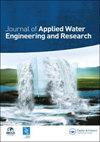坦桑尼亚供水弹性措施的验证和试点评估
IF 1.6
Q4 WATER RESOURCES
Journal of Applied Water Engineering and Research
Pub Date : 2022-01-09
DOI:10.1080/23249676.2021.2017804
引用次数: 0
摘要
在灾害中,供水系统(wss)面临着持续的水污染和故障风险。一些研究开发弹性指标没有验证过程,以确定其适用性和适用性。目前的研究考察了现有的定性弹性工具的有效性,这些工具是通过对变量的预评估、三轮德尔菲过程开发的,并在三个案例中测试了适用性和普遍性。验证通过六个阶段的评估过程应用工具开发数据:(1)群体意见,(2)意见的收敛性,(3)可靠性分析,(4)项目间相关性,(5)协议水平,(6)适用性和普遍性。该工具包括技术、组织、社会、经济和环境方面的47项指标。变量的内容效度较好,群体意见强,意见趋同显著,信度高,关系模式充分,约98%的指标一致性良好。此外,有足够的适用性和普遍性,因此,变量被认为是有效的坦桑尼亚wss和其他发展中国家。本文章由计算机程序翻译,如有差异,请以英文原文为准。
Validation and pilot assessment of Tanzania water supply resilience measures
Water supply systems (WSSs) face constant water contamination and breakdown risks during disasters. Several studies develop resilience metrics without validation processes to ascertain their suitability and applicability. The current study examines the validity of existing qualitative resilience tools developed through a pre-assessment of the variables, a three-round Delphi process, and tested in three cases for applicability and generality. Validation applied the tools development data through a six-stage assessment process: (1) Group opinions, (2) Convergency of opinions, (3) Reliability analysis, (4) Inter-items correlations, (5) Level of agreements, (6) Applicability and generality. The tool encompasses 47 indicators in technical, organisational, social, economic, and environmental dimensions. The variables show better content validity with strong group opinions, significant convergence of opinions, high reliability, adequate relationship pattern, and excellent agreement in about 98% of indicators. Besides, there is adequate applicability and generality, thus, the variables are considered valid for Tanzania WSSs and in other developing countries.
求助全文
通过发布文献求助,成功后即可免费获取论文全文。
去求助
来源期刊

Journal of Applied Water Engineering and Research
WATER RESOURCES-
CiteScore
2.90
自引率
16.70%
发文量
31
期刊介绍:
JAWER’s paradigm-changing (online only) articles provide directly applicable solutions to water engineering problems within the whole hydrosphere (rivers, lakes groundwater, estuaries, coastal and marine waters) covering areas such as: integrated water resources management and catchment hydraulics hydraulic machinery and structures hydraulics applied to water supply, treatment and drainage systems (including outfalls) water quality, security and governance in an engineering context environmental monitoring maritime hydraulics ecohydraulics flood risk modelling and management water related hazards desalination and re-use.
 求助内容:
求助内容: 应助结果提醒方式:
应助结果提醒方式:


